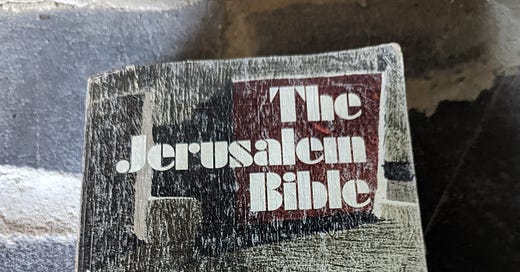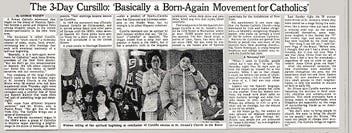This is probably going going to be the last post on this Substack. I know, c’est dommage and this will definitely give you so much more free time since it is updated so very frequently.
But as I said at the beginning, I never anticipated this being an ongoing, eternal project, but more of an archive. A tiny little archive. And it’s served its purpose for me, at least.
(Do look for something new on this platform that I will be announcing later this week)
So I’ll end with where perhaps I should have begun – what inspired the title of this place: the Trust Walk.
So our topic for today is retreats. And if you would like to fold prayer groups into that, feel free.
The essential Catholic understanding and experience of retreat, for both clergy and laity has, for centuries involve some combination of talks by spiritual directors, spiritual reading, individual prayer and meditation time, and some sort of sacramental experience- Mass, Confession, and so on.
But in the mid 20th century, in Spain, that began to change.
Cursillo began as preparation – the word means “short course” – for men for the pilgrimage to Santiago de Compostela. It took off from there, became popular across Christian denominations in its own right and became the model for a number of other weekend experiences, ranging from Marriage Encounter to various youth-oriented programs like TEC, Kairos and….Search. By the late 1970’s Search and TEC had become the normative “retreat” programs for teens in much of the country.
Cursillo wouldn’t describe itself as a “retreat” in the traditional sense – it is a weekend experience in encountering God in a new, deep way, hearing testimonies of others, having various types of encounters, and then looking forward – Ultreya or the next day – which is the rest of your life – to following Christ more faithfully. It’s a short course - with continuing support through community - in Christian discipleship.
I’ve never made Cursillo, know many who have and benefited greatly from it – especially back in the 80’s and 90’s – but as a high school junior, I did go through the rite of passage called Search.
And it was a rite of passage for us. Everyone made the Search retreat in our high school as a junior, and a lucky few became leaders as seniors.
It did, at the time, have a deep impact on me, breaking down the walls that existed between me and my parents and opening me, a young woman with a bizarre intellectual interest in religion even then, as well as no little arrogance, to a more holistic, humbler understanding of faith and myself.
But if you have made that type of weekend (should I call it a retreat? Will the sticklers get stickly?), you might, like I, have had second thoughts as time moved on, as the emotional high faded and perhaps, as you observed the nature of the “community” that grew from it.
In short, after a couple of years, I began to wonder if I’d been emotionally manipulated, if what I experienced was spiritually authentic, and a decade or so down the road, I was sure that I had and that it wasn’t.
It’s tricky, isn’t it? Deeply authentic spirituality, profound relationships with God can begin in any number of ways, including deeply emotional experiences.
We can begin anywhere – in this type of retreat, in an insight gained from a book, in a quiet moment under the stars, at the birth of a child or the death of a parent, our own illness and failure – and, open, we embark on the journey with the God who meets us in those places.
But that doesn’t mean all of those experiences and beginnings are good or necessary. If a death throws me into a more serious consideration of God’s existence, does that make the death a “good?” No. If glimmers of the numinous and transcendent first reach me in a Hindu temple, does that make Hinduism “true?” No.
Oh, I forgot, this blog isn’t for analysis…only storytelling. Well, that’s a little more challenging with this subject.
I’ll try.
In this type of retreat, participants are put in intense community. Sleep deprivation isn’t built into the schedule, but with a bunch of teenagers, what’s going to happen? Lots of sleep? No, and fatigue = vulnerability. You hear testimonies – sometimes on hard, sad subjects – from your classmates you might have thought had it all together. It’s bonding. You’re invited to share, you’re reassured that you are deeply loved. At one point, you’re given letters from your parents and other important people, telling you - from those people with whom you might have fraught, to say the least, relations - how loved you are.
And of course, you know none of this ahead of time. What happens on Search stays on Search. It’s a surprise, and that’s a big part of the impact.
For us, the biggest surprise and the climax was – you got it – the Trust Walk.
We were blindfolded and led on a walk through the campus (the retreat took place on the school grounds.) I suppose at certain points we stopped, heard Scripture readings, went around obstacles, and moved on. The Scripture readings built – perhaps it was the Passion being read, I don’t know – and it culminated into us being led into a space where we sat and told to take of our blindfolds – to be met in the darkness that was lit only by the large, quite beautiful stained glass in the shape of a cross in our school chapel.
Commence breakdown.
Some criticize this style of retreat quite strongly, saying that it is nothing but emotional manipulation and even grooming. I won’t go that far – to say that it’s nothing but emotional manipulation but I don’t see how one can argue that emotional manipulation is at the core of the “system.” To isolate, wear you out, get you in a vulnerable state, “get you to feel” or to “get you to see” and most of all – did you cry? How much did you cry?
So what’s the fruit?
In the short run, it was a full, fun basket, but, like any church-related activity or entity it soon began to turn. The next year I saw the cliques that had developed among those chosen (by whom?) to be Search leaders (not me, and no I’M NOT BITTER), who then became the same kids given the honor of becoming Eucharistic Ministers. (NOT BITTER)
I saw the intense friends-4-ever relationship that were discovered and declared on the weekend dissolve within months, not surprisingly. And I’ve seen it in others who’ve gone through similar weekends - I mean, it’s the lifeboat or elevator experience, but with a hopeful veneer of the Spirit, I guess.
I saw, further down the road, as I went through college and into adulthood, into Church life that, on any given Sunday, gave me anything but an emotional high – the dangers of centering adolescent formation on emotional experiences. It is hard to avoid, since teens are emotional, and how many of our young saints’ strength is rooted, not only in their faith, but their faith nourished by their youthful passion?
But at the same time, I decided, especially as I began to work with teens myself, that adults should know better than to stir up these kinds of expectations in the core of a young person’s faith – that the gauge of faith is how strongly one feels, that the authenticity of a spiritual experience is determined by the emotions it evokes, that if you’re not feeling it, you might not be believing it, and there might be something lacking in your faith. And when you leave, and that community is no more, and the people in the parish you decide, with great trepidation, to try out your first Sunday in your new town that you’ve moved to for your grown-up job - well, when those people don’t notice you and might even act annoyed that you’re there - what happens then?
That is problematic in all sorts of ways.
Not to speak of the ways an emotionally-centered, leader-dependent, intense model of spirituality with vulnerable young people is a fertile landscape for abuse, spiritual and otherwise.
That wasn’t the only retreat of those high school years, though.
There was one year where they brought in an old-school Redemptorist not for a retreat - since we didn’t go anywhere and it was for the whole school, right before Holy Week - but for a mission, and if you know your religious orders, you know what to think, historically, when you hear “Redemptorist” and “mission” - mentioned in the same breath.
And that was exactly what we got. Basically The Day Christ Died in all the detail that would impact 15-year olds, even in 1975, even with Jesus Christ Superstar and Godspell running in the background of our lives.
For our senior retreat - spring of 1978 - we went down to the Jesuit Retreat House in Atlanta for a weekend – and this was a proper retreat. Talks, Mass instructions on how to do lectio divina, and time to do it.
(And also time to go into the woods and drink. I think a few people got sent home for that.)
In that chapel, the Blessed Sacrament quietly waiting, sitting on the ground strewn with throw pillows, I read and prayed through John 19 in the Jerusalem Bible I’d been given in 9th grade, by myself, in silence. By myself that night, yes, but, I realized in a deeper, and as it turned out, far more lasting way than came to me through the tears of the Trust Walk - not at all, or ever - alone.






I went through a very similar retreat in the 2010's. Interesting hearing where it came from.
I never cried. I thought something was wrong with me.
By the way, I certainly don't blame my high school religion teachers for these dubious choices. They were watching their world vanish. Our most beloved religion teacher (who was also a mom of two students at our school) spent several weeks on sexual topics, and she presented a huge number of reasons why we shoudln't have premarital sex. Every approach was included: it's cruel to emotionally manipulate a girl into sleeping with you (it was an all-boys school), "boys play at love to get sex, girls play at sex to get love," it's so much better if you wait, contraception is unreliable (we had to memorize the failure rates for each method), etc. Yet all the time she was silently giving us the impression that she knew this was a lost cause, because we were all going to do it anyway. She even mentioned that her college-age son was sleeping with his girlfriend, but he had respected his mom enough to tell her about it.
At my twenty-year reunion I found that the majority of my fellow alumni were no longer practicing their faith. A significant minority seemed lukewarm, but had returned to church when they had kids of their own. There were two people who were serious Christians (myself a revert, and another who had joined a Pentecostal church).
Amy, I think it's almost impossible to separate cause from effect here. Our religion teachers honestly thought the best way to reach us was through Jesus Christ Superstar music.... but they also honestly loved that music.